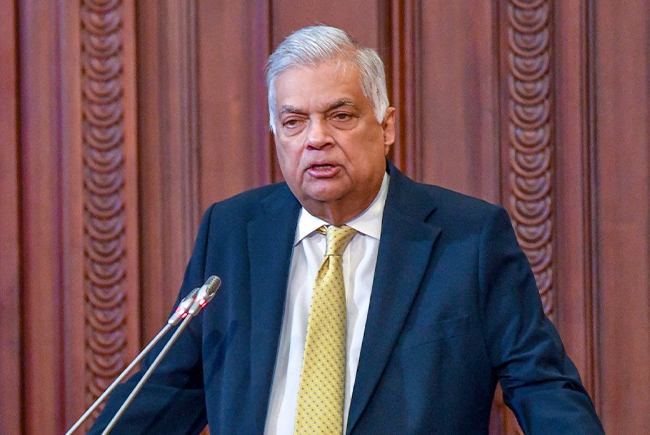President pledges to uphold social and economic rights of upcountry Tamil community
February 19, 2024 06:25 pm
President Ranil Wickremesinghe has emphasised the need to uphold the social and economic rights of the Indian-origin Tamil community.
The President made these remarks at the inauguration ceremony of the fourth phase of the Indian housing project ‘Bharat-Lanka’, held at the Presidential Secretariat on Monday (19 Jan.).
Commenting in this regard, the Head of State noted that the government is actively initiating this process, with negotiations currently underway with estate companies to acquire land for the construction of these houses. Consequently, we anticipate commencing related housing programs in the near future.
“The Tamil community of Indian Origin, who have made significant contributions to the country’s economy, have unfortunately suffered great losses due to the lack of land and housing ownership. Today, they have been deprived of their political rights, but it is imperative that their economic and social rights are upheld”, President Wickremesinghe said.
He further revealed that discussions are also underway to find solutions for the issues faced by those in the North East, and the Tamil and Muslim communities residing in the Upcountry region, the President’s Media Division (PMD) reported.
Speaking on the recent economic crisis faced by Sri Lanka, President Wickremesinghe acknowledged that while acute hardships were faced for a certain period of time, Sri Lanka has now overcome bankruptcy and resumed economic activities, with significant financial aid from India.
“It is crucial to acknowledge that our progress from the recent economic crisis was significantly aided by the financial support provided by India. Without this assistance, our path forward would indeed be challenging”, he said in this regard.
Attached below is the full speech made by President Wickremesinghe:
'On the occasion of the 200th anniversary of the arrival of the Upcountry Tamil Community to Sri Lanka, the Indian government has generously provided support for this housing project. I express my sincere gratitude to the Government of India for this gesture.
The Tamil community of Indian Origin, who have made significant contributions to the country’s economy, have unfortunately suffered great losses due to the lack of land and housing ownership.
Today, they have been deprived of their political rights, but it is imperative that their economic and social rights are upheld. The government is actively initiating this process, starting with negotiations with estate companies to acquire land for the construction of these houses. Consequently, we anticipate commencing related housing programs in the near future.
Furthermore, the government has prioritized the advancement of education in the estate sector. Education levels within estates lag behind those in other regions, necessitating the establishment of equitable educational standards across all schools.
Moreover, it’s essential to recognize that not all upcountry residents engage in plantation work. Thus, efforts must extend to providing opportunities for youth, including access to education and vocational training, particularly geared towards international employment opportunities.
Currently under deliberation is the decision between continued plantation labour or the provision of land plots as per the plantation agreement, aiming to elevate individuals to the status of small tea plantation owners. This initiative seeks to foster economic empowerment and equality among upcountry communities.
Our aim is to convene all political representatives and present unified proposals devoid of party divisions within the next month.
The government is diligently addressing challenges one by one. Currently, discussions are underway to find solutions for the issues facing the people of the North East. Simultaneously, we must prepare to advance the nation’s economy by addressing the concerns of the Tamils and Muslim communities residing in the Upcountry region.
While we faced hardships for a period, we have now overcome bankruptcy and resumed economic activities. Upon assuming office, the nation grappled with shortages of food and fuel. Today, however, we have successfully overcome these shortages. As we implement economic programs, challenges such as tax burdens arise. Nevertheless, this burden is not permanent and in a matter of months, relief will be provided to the people.
It is crucial to acknowledge that our progress from the recent economic crisis was significantly aided by the financial support provided by India. Without this assistance, our path forward would indeed be challenging.
Furthermore, we are actively engaged in enhancing our economic ties with India, particularly during this period of India’s rapid economic development. During our discussions with Prime Minister Narendra Modi, we extensively deliberated on bolstering the relationship between our two nations.
In conclusion, I express my heartfelt gratitude once again to the Government of India for their invaluable support in initiating this program'.














